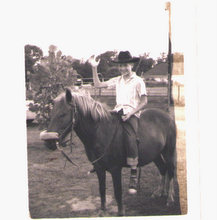.JPG)
The Philosophy Club in high school was more than just a discussion group. They sponsored Smuff, a food drive for Biafra, and were the Hackensack sponsors of the Voting Age Coalition. The Voting Age Coalition was a state-wide effort to decrease the voting age to 18 in New Jersey. It led to a ballot question in the November 1999 election in New Jersey.
I got to be a leader of this group and was in fact the Hackensack coordinator. I remember well the meeting we had in the auditorium of the high school. It was well attended and we teamed up people to distribute materials in their neighborhoods. One female student indicated she could distribute literature around Summit Avenue and Beach Street. I had just met someone else from the same neighborhood. I described the second lady.
"I remember her", I said in a loud voice, "she was real small and she had black hair and she had these thick glasses". Suddenly she appeared. She had frizzy hair. She met her partner to be for the leaflet distribution. She looked at her and said "bless you".
That fall Richard M. Nixon came to Hackensack High School to support Cahill's run for election as governor. Even though I had a paid job working for Meyner, I played "Hail to the Chief" along with the rest of the high school band, for Nixon and his daughter Christie. They told us to put our "Vote yes on 18" signs down.
Cahill won and the initiative was defeated. The frizzy haired young lady had a lost but not defeated party after the election. The party was held in her mother's garden apartment. The hostess laid out like a corpse on the windowsill. Eventually she came back to life. We talked. She asked me if I was happy or was it a front. We discussed colleges. We both had applied to Temple University in Philadelphia. For me it was my backup. She was planning to go there. She wanted to major in psychology.
We exchanged phone numbers and the family telephone rang like blazes after that. I was invited to watch the sun rise over the George Washington bridge. I was invited to go to New York to pick up underground newspapers for distribution in New Jersey.
We became a crowd, two black kids, a Jewish kid, two Irish girls and dear old me. We marched all over Hackensack after school. One day we walked into a delicatessen. The frizzy headed girl bought us all tongue. I never liked a food that could taste me as I was tasting it.
The group showed up at my parent's house on Christmas eve. They admired the Christmas tree and the witty thing my mother had put up on the toilet bowl with Santa covering his eyes.
The classic Christmas conflict showed it's head. Parents believed that Christmas eve should be spent with family. Kids believed that Christmas eve should be spent with friends. They believed that there was enough family time on the 25th. I had my first Christmas fight with my parents. I was now growing up. My older brother was a veteran of such conflicts.
Later that night, I ended up watching "A Christmas Carol" at the frizzy haired girl's apartment, along with a few members of the hip intellectual crowd. A few days later, I made out with the frizzy haired girl. No she had straight hair by this time.
And so the sixties ended for me. I was in a crowd. I was politically active and I had applications out for several colleges. I was a happy camper that Christmas.
.JPG)


